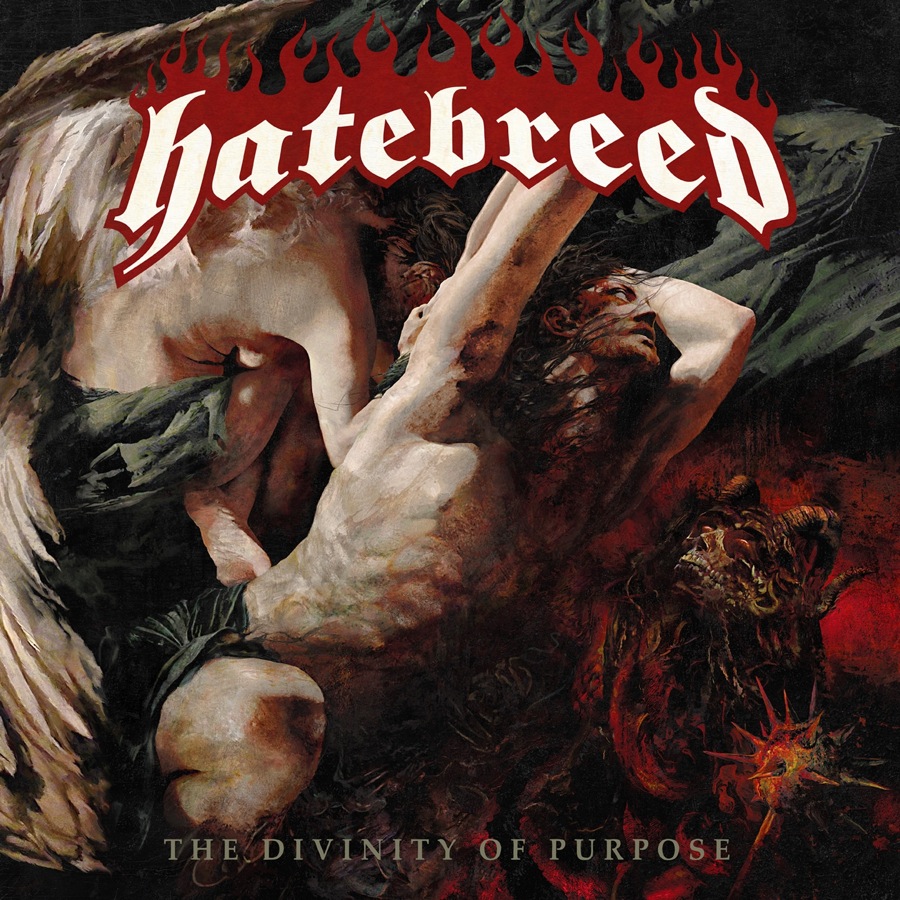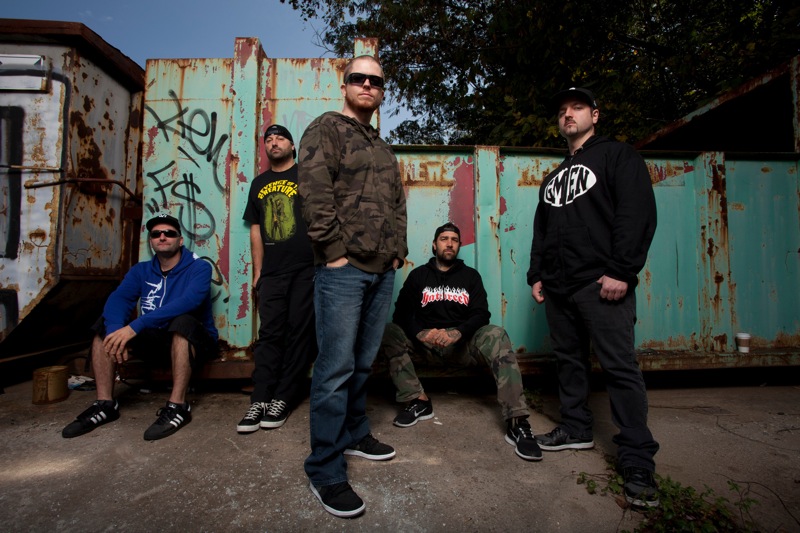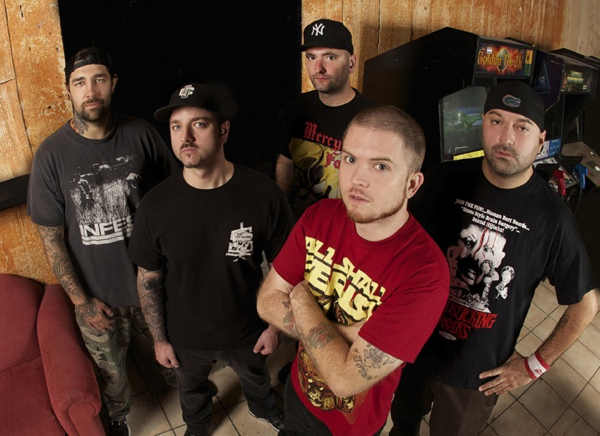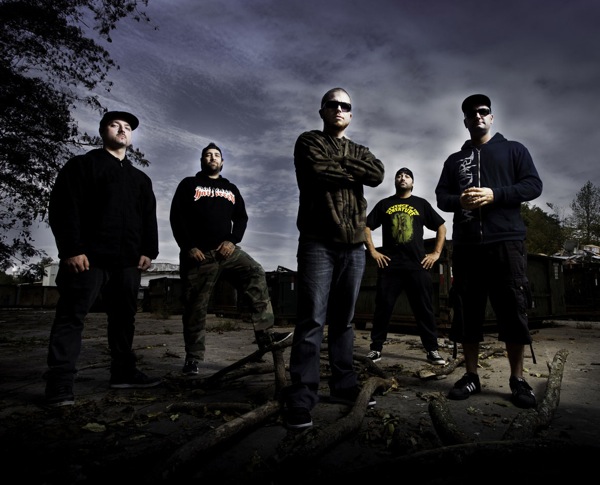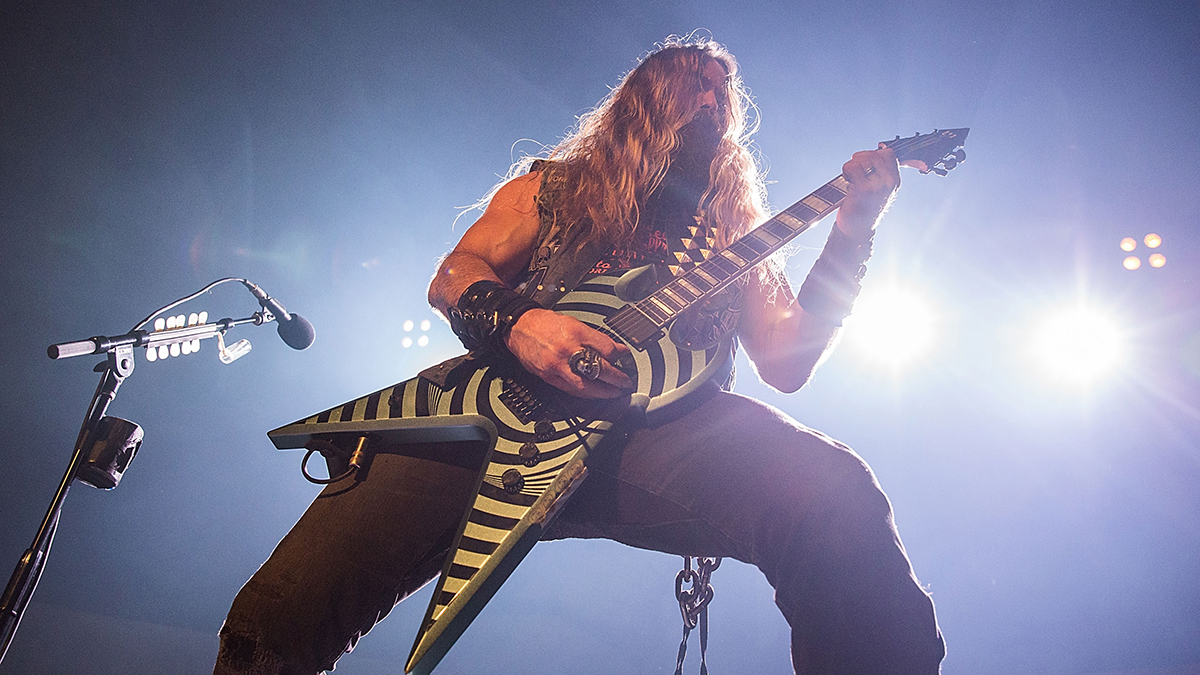Interview: Hatebreed Guitarist Frank Novinec Discusses New Album, His Roots and Gibson Guitars
All the latest guitar news, interviews, lessons, reviews, deals and more, direct to your inbox!
You are now subscribed
Your newsletter sign-up was successful
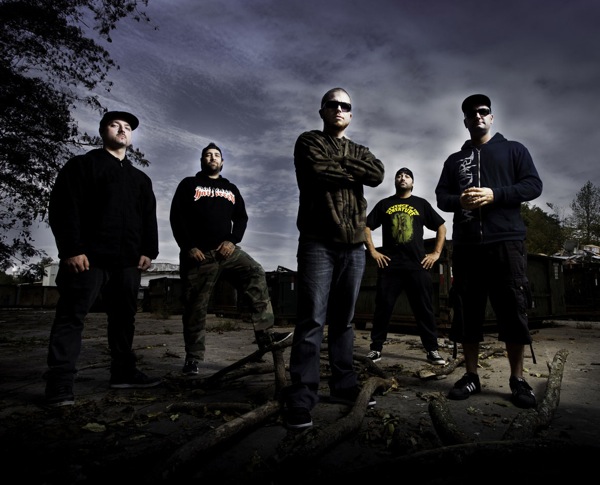
New Haven, Conecticut-based hardcore-punk-influenced metal band Hatebreed released The Divinity of Purpose January 29 via Razor & Tie.
The band, which is known for its high-energy shows, truly delivered the goods on their new disc, successfully capturing the high-octane feel with which they've become synonymous.
They’ve recently completed a US headline tour with Shadows Fall, Dying Fetus and The Contortionist. During that tour, I chatted with guitarist Frank Novinec about the new album, live performances, his musical background and his love of Gibson Les Pauls.
You can read our conversation below and check out the band online at their official website, hatebreed.com.
GUITAR WORLD: Right now you’re on a US tour. From what I’ve been hearing, the shows have been amazing. What has it been like for you?
We’ve been doing small shows in secondary markets, because at the end of last year we supported Lamb Of God in major markets and before that we also celebrated the 10-year anniversary of the Perseverance record as well, so we thought why not go and play in some smaller cities and promote this record that came out on January 29 over here. It’s been fun! We’ve toured with Shadows Fall before, so we’ve had a good time with those guys, and Dying Fetus and The Contortionist have been out with us as well, so it’s been a good time.
I was looking at all your set lists and was surprised to see only two songs from the new album. Why is that?
All the latest guitar news, interviews, lessons, reviews, deals and more, direct to your inbox!
We’re doing two or three songs every night, "Honor Never Dies," "Put It To The Torch" and "Indivisible." We have a lot of songs to play throughout the set, and a lot of staples in the set that we have to play. We have so many records out now and so much material, we have to balance it out by playing songs from every Hatebreed record. So that’s the reason for that.
The new record hasn’t been out for long, so we’re not going to bore everybody who doesn’t know it or just got it and aren’t familiar with the songs by playing half of the new record’s worth of material. When you go to see a band, you mostly don’t want to hear them play the entire new album. You want to hear the classics as well. So three new songs, I think, is plenty for our set.
I went to see Iron Maiden recently and they opened the set with five new songs. No one knew what they were doing, and it was a bummer. So we don’t want to kill the crowd like that. They want to hear us play songs like "Destroy Everything," "To The Threshold," "Live For This," "This Is Now" and "In Ashes They Shall Reap." So we have to play those and along with that we mix songs from other albums that we normally don’t play. As for the new record, we’ve included the three singles. We’ve already put out a video for "Put It To The Torch"; we’re making a video for "Honor Never Dies," which will be out soon, and one for "Indivisible" as well. I think that’s enough, at this point, anyway.
In terms of the new album, what was the process like for you, especially guitar-wise?
We went back to the roots on this album. There’s definitely more meat and potatoes, and the songwriting comes from the root of Jamey and Chris, who’ve been writing the songs from day one. So they came up with the songs and then we went into the studio and changed a few things around if they needed to be. The one good thing we had about this record was, while we worked on it, a lot of times we were able to go back and review things. I don’t think we were blessed with that on the last record. On this record, we were able to have the time to go back over and over and make the record exactly how we wanted to.
Now that we’re on the road, there’s not going to be any more reflecting back along the lines of, "We could have changed this and changed that." I think it’s perfectly how we wanted it. One thing I can say I’m proud of, which you said earlier, is that all the songs are strong from beginning to end. We call it "all killer, no filler." That’s really what it is. It’s a strong record, and we’re happy with the response we’ve gotten. It’s been overwhelming, and it’s good for us to have a record out after three years now, to be able to play live and have new material for everybody.
You mentioned you’ve been playing "Indivisible," my favorite song on the album. It has the typical old-school D-beat, and it’s a lot different from the rest of the album. Thoughts?
"Indivisible" is one of my favorite songs too, and D-beat is my favorite kind of music, the second wave of English punk, all the bands from 1982 and all that. So I’m glad we’ve been able to incorporate that song into the record and still have a song like "Dead Man Breathing," which sounds like Slayer, to mix that with "Indivisible," which sounds more like The Exploited to me, and somehow make it all work. We’re able to do that with the sound of Hatebreed, with the guitar tones. We try to make Hatebreed a universal band that’s appreciated by people that like punk rock, for people that like hardcore, metal or rock. We’re very lucky we have such a universal audience. We’re kind of like the Motorhead of our genre.
Your shows are always about the energy and the movement. Do you also like to get involved and move around on stage?
I’m moving around quite a bit on stage. Besides Jamey, I’m moving around the most. I just like to do whatever I can to put on a show. I’m a performer and I enjoy the energy in a show more than being a musician. Wayne is more of a musician and more of a player than I am. So I’m out there getting the crowd wound up, and Jamey and I have a good time just giving something visual to see, and making sure all the audience has a great time at our shows. They beat the crap out of each other, but as long as everybody leaves with a smile on their faces and has a good time, we’re happy. This is the best part of the day for us, to be able to play. The rest of the day is terrible. We just have that hour on stage and we want to give the most to the fans so they remember our show for a long time, at least till the next time we see them.
You said you’ve always been a fan of D-beat and the second wave of British punk. Is that what you grew up on?
No, I grew up in the '70s, and I got introduced to music at an early age. My parents tell me that when I was a baby, I used to stand holding on to my dad’s tower speaker and play "Smoke On the Water" on it. I had a record collection when I was 5 or 6, which was Kiss records and things like that. Kiss is still one of my favorite bands. We ended up being direct support for them at the Graspop Festival in Belgium. I’ve met them a bunch of times and I’ve seen them 30 to 40 times. I’m a fan of all of it.
I’m an encyclopedia when it comes to music. I love the '70s prog bands, I love the '60s Motown music and Philadelphia soul music. I love the '80s too, the one-hit-wonder bands. There are people in my band that love R&B. If you took all of our iPods, you’ll find every type of music that ever existed. If we go on a music trivia show, I think Hatebreed will pretty much crush any band out there.
So we’re listening to everything, but as you get older you do that anyway. You open your mind more. When you’re younger, you can be a little close-minded about these things. That speaks a lot about Hatebreed. We want everybody to open up their minds. Not everybody is going to like our band, but if you could just come and have a good time and open up your mind, you’ll realize it’s all aggressive music at the end of the day, and you don’t need to categorize or make these genres to divide the music into small parts. The music scene is dying, so it’s about time we realized it’s all aggressive music. The underground scene was thriving when we were going to shows in the '80s and early '90s because there were thrash bands, punk bands and hardcore bands playing shows together. So we try to do that too. We’ve toured with Five Finger Death Punch and now we’re out with Dying Fetus.
You joined the band in ’06, and Hatebreed put out a covers album in ’09 called For The Lions. I guess that must have helped you discover your band mates’ influences and backgrounds, true?
I’ve been friends with them since they pretty much started the band, so I’ve known them and their tastes. I saw Jamey and Sean almost every day during the early 2000s till the time I joined. I always knew about their influences, but the beautiful thing about the covers album is that we were able to showcase the talents of the members in this band without having to incorporate it into our own music [laughs]. When you listen to the soloing on the Slayer cover, the drumming on that record is over the top. I think it surprised a lot of people who think we’re just a hardcore band and we can’t play, and things like that.
So that was cool to show what we’re capable of, and obviously paying respects and tributes to the bands that paved the way for us, whether it’s a big band like Slayer or a small band like Negative Approach. Also, it was aimed to open the ears of our fans to some of those bands that they wouldn’t have been familiar with, like Negative Approach, Sub Zero, Obituary and obviously Metallica, Slayer and Sepultura. We just wanted people to check out the bands we covered and check out our roots.
It was for fun, really, but it was tough to decide what songs to choose. Every member had his own choices, and we still always joke on the tour bus or backstage about which songs we should cover. Our list is endless. We haven’t even done Motörhead yet. So we’ll see. Don’t be surprised if we do another one down the line. It’s fun and it’s just another product out there from Hatebreed for people to enjoy.
Is the Gibson Les Paul your primary guitar these days?
I play Gibson SG, Gibson Explorer and Gibson Les Paul, all of them. I’ve been playing Gibson my whole life. Gibson and Marshall works for AC/DC, it works for me for sure [laughs]. The louder I crank it up, the better it sounds, and that’s just something I’ve loved ever since I was a kid. A lot of kids dream about playing that kind of equipment. I enjoy it, and in fact I was just online on the Gibson website today before doing this interview, looking to get a Firebird or another SG. But yeah, Gibsons and Marshalls have always worked for me.
You brought up AC/DC, and the Les Paul is used by all kinds of musicians across the board. Is there something about the guitar that makes it so versatile, or does it come from the musician who plays it? What’s your take?
When I grew up, I was seeing a lot of bands playing it, and a majority of the heavier rock bands from back then were always playing Gibson. So, playing the heavy music that we do obviously, that guitar’s sound has had an influence on me for sure and with the EMG pickups and the Marshalls that we use, we’re able to get the desired tone. A lot of people in our scene are endorsed by other companies just because they wanted free guitars and stuff, but to me I’d rather play the best. To me, there’s Fender or there’s Gibson as far as guitars are concerned. That’s really it when it comes to this kind of music, and even the Fenders are tough to get to sound heavy. I grew up watching Angus Young and Ace Frehley, so obviously Gibson is where it’s at when it comes to heavy rock guitar. There was also Zeppelin, and the list goes on. Black Sabbath too. The best of the heavy music world are playing Gibson.
Hatebreed shows can get so crazy, especially the smaller shows with all the stage diving. Has your gear ever been seriously damaged during a show?
Fortunately, no. We were just in Europe and we had a rented backline. It wasn’t even the stage divers. The music was just so loud that something came crashing down and knocking the wall of amps, breaking the plugs at the back. But otherwise I’ve never actually had anything crazy happen.
But it’s funny that we’re doing this interview today and you’re asking about that [laughs]. Today, we opened up one of the cases of my guitars and on one of my Gibsons the headstock broke again for the third time in the same place, so I think it’s time to retire that one and keep it at home. I’ve had it on the road a lot but it’s not staying together for me.
As far as the fans go, people do try to get on stage and not watch what they’re doing. They’re more concerned about clearing the barricade or knocking into you or the amplifiers. We have barricades for most shows so it doesn’t get too crazy. We don’t invite an entire crowd up on stage either. I think when you do stuff like that, obviously it’s a lot of fun and memorable but that’s when you really can get your equipment screwed up. So we’ve been fortunate with keeping our gear safe [laughs], but we do so much touring and there’s so much wear and tear that it’ll get screwed up on its own. We don’t need the fans’ help.
Andrew Bansal is a writer who has been running his own website, Metal Assault, since early 2010, and has been prolific in covering the hard rock and heavy metal scene by posting interviews, news, reviews and pictures on his website — with the help of a small group of people. Up till February 2012 he was based in Los Angeles. After that, he had to move to India, but is still carrying on his heavy metal endeavors with the same intensity.
